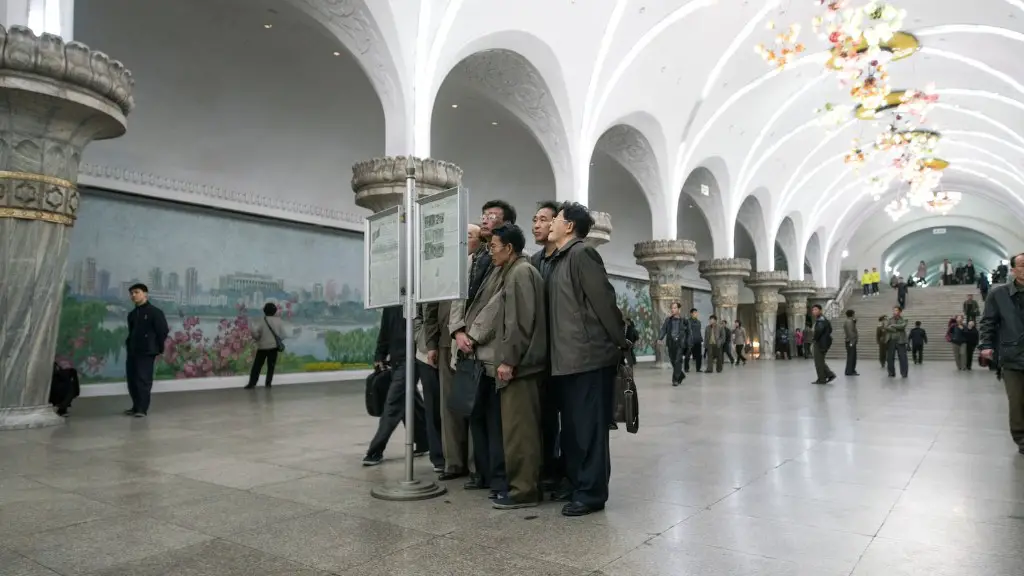Background Information
In November 2017, it was announced that North Korea would be sending athletes to the 2018 Winter Olympics in Pyeonchang, South Korea. It was a potentially historic move, as it would have marked the first time North Korean athletes had participated in the Olympics on South Korean soil. This came after the two countries had held talks earlier in the year, which were seen as a sign of detente between the two nations. But with the Games set to start, there is still much uncertainty as to whether or not North Korea will ultimately participate.
Relevant Data and Perspectives from Experts
According to a poll of South Korean and foreign experts conducted by Yonhap News Agency, most believe North Korea is likely to take part in the Olympics, with 53 percent predicting the North will participate. While 37 percent thought the North could take part but were unsure, only 10 percent said they expected the North to stay away.
“I think North Korea will participate in the Olympic Games and will be a mastermind of media coverage, manipulating their propaganda of nuclear state and armed forces,” said Dr. Kim Jae-chun, a professor at Seoul National University. “It is fair to say that South Korea has provided amazing momentum for the North’s participation in the Olympics, by offering various ways to interact, such as bus service and video conferencing.”
Insight and Analysis
The decision whether or not to participate in the 2018 Olympics is likely to be a difficult one for North Korea. On the one hand, participation would be a sign of goodwill to the South, and could reduce tensions between the two countries. It would also give North Korean athletes a chance to showcase their talents on the world stage, and potentially win medals for their country.
On the other hand, participation would mean North Korea would have to appear open to the international community, which is something its leadership is often resistant to. It would also give South Korea a chance to look better on the international stage by being seen as accommodating to its neighbor.
Ultimately, participation in the 2018 Olympics could be a way for North Korea to signal its willingness to engage in dialogue and improve relations. It could be seen as a way of easing tensions and potentially engaging in a process of reconciliation.
International Perceptions
The international community seems to be cautiously optimistic about North Korea’s potential participation in the games. There has been an increasing demand for dialogue, with both Russia and China urging dialogue between the two Koreas, as well as with the United States.
While the United Nations has issued sanctions against North Korea, there is a recognition that the situation must be handled on a diplomatic level, and that isolating the country is not a solution. The presence of North Korean athletes at the games could be seen as a sign that the country is willing to engage in diplomacy, and could potentially be seen as a way to ease tensions and improve relations.
Question of Timing
The main question as of now is when North Korea will announce its decision. International Olympic Committee (IOC) president Thomas Bach said that the North has until January 30 to register its athletes in order to participate in the games. With the deadline quickly approaching, and no word from Pyongyang, the IOC will likely be forced to make a decision on the participation of North Korean athletes on its own.
Impact on Olympic Spirit
If North Korea does participate, it could have a positive effect on the Olympic spirit of unity and sportsmanship. The participation of North Korean athletes could be seen as a show of respect to South Korea’s hosting of the Olympics, and could potentially also lead to better relations between the two countries in the future.
At the same time, it could also present a challenge for athletes from other countries. South Koreans may be more focused on the presence of their northern neighbors rather than on the competition itself. This could potentially lead to a distraction from the actual sporting events, and could even lead to potentially divisive political statements coming from either side.
Security Concerns
South Korea is also facing the challenge of ensuring security during the Olympics. It is a difficult task considering its neighbor is a nuclear power, and will have athletes attending the games. South Korean officials have sought to allay any security concerns by introducing additional security measures, including drone detection systems, cyber security teams, and joint military exercises with the US.
However, there are some who are still expressing doubts about North Korea’s potential participation. A recent survey by Korean Gallup found that 52 percent of South Koreans would support the team, but only 20 percent think it is a good idea for the North to actually participate. This is largely due to security concerns, as well as worries that it could be a propaganda move by Pyongyang.
Impact on Inter-Korean Relations
Ultimately, whether or not North Korea takes part in the 2018 Olympics could have a significant impact on inter-Korean relations. If it does participate, it could signal a move towards improved relations, eventually leading to more dialogue and possibly even a lasting peace. On the other hand, if North Korea opts to stay away it could increase tensions between the two countries, as well as negate any potential breakthroughs in diplomacy.
Political Implications
The decision of North Korea to participate in the Olympics could also have wider political implications. It could be seen as a move towards North Korea coming in from the cold and re-engaging with the international community. It could potentially lead to the easing of international sanctions and eventually even open the door to diplomatic relations with the United States.
At the same time, it could also be a move towards greater cooperation between China and North Korea. China has long been a supporter of Pyongyang, and participation in the Olympics could be seen as an effort to improve its relationship with the North. In turn, this could lead to the easing of tensions between China and the United States, and potentially improve the regional security environment.


